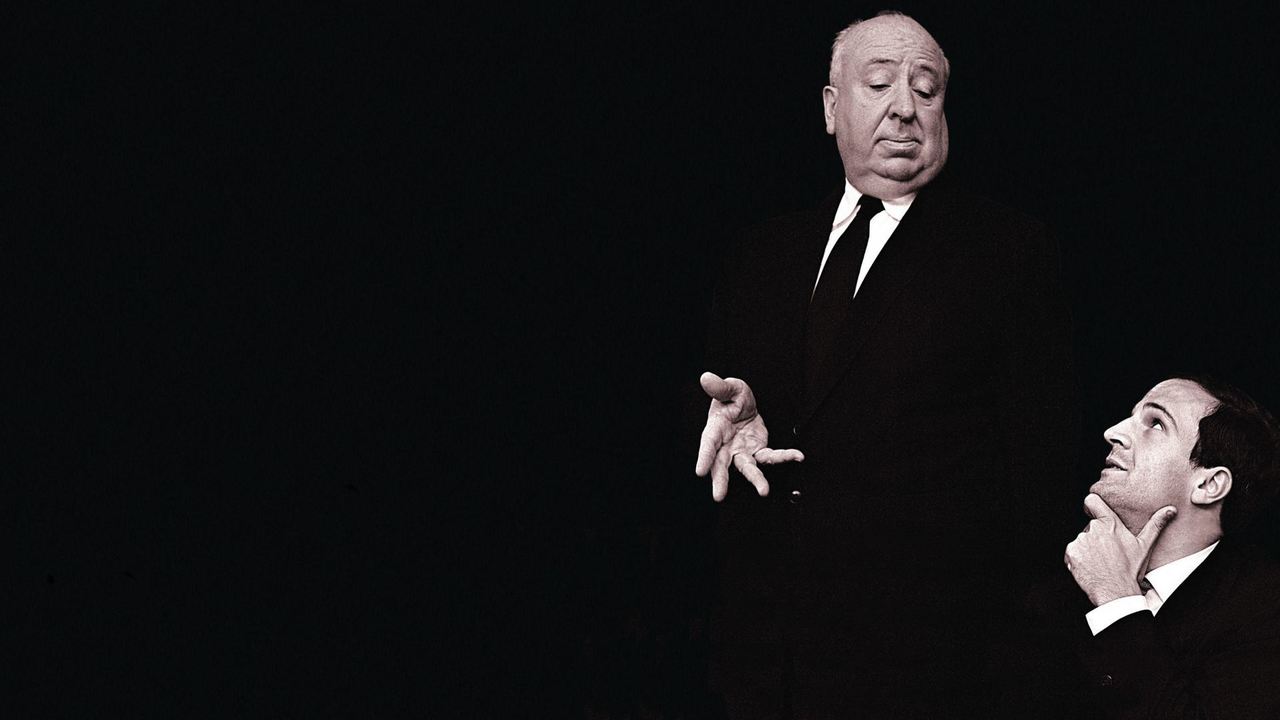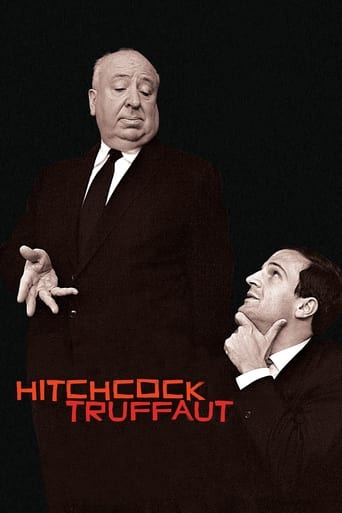

I would encourage anyone who viewed this film to get a copy of the book. For it is in the book that we learn about the master and what he did and how he thought. This was Truffaut's baby and it is incredible that this is left for us. The strength of the film is in the commentaries of the participants. We get a picture of the admiration shared by the two directors. That said, despite the limitations of 85 or so minutes, we are made privy to techniques employed. The focus is really on two films, "Vertigo" and "Psycho." That is enough in some respects because most of Hitchcock's dazzle is employed here. The lesson learned is that Hitchcock as a stylist and a sort of visual tyrant made him what he was. One interesting point made was what would have happened if he had been forced to work with egos like Marlon Brando, James Dean, or Dustin Hoffman, who certainly would have tried to manipulate Hitchcock. Montgomery Clift tried and failed; so we get a sense of that thing. All in all, this is decent, but it is more the observation of the director who attempted to produce a summation of the book. It only works in bits and pieces. Still, I'm glad I got a chance to see it.
... View MoreHitchcockTruffaut is a documentary about director Alfred Hitchcock inspired by the book of the same name produced by François Truffaut shortly before his death in the early 1980's. The documentary shows pictures of Truffaut and Hitchcock during the course of Truffaut's extensive interview with Alfred Hitchcock as well as frames from some of his greatest films. This film provides a great understanding of Hitchcock as an artist or "auteur", a term associated with great directors who told their stories using the medium of film, not simply shooting actors performing a story. The visuals for Hitchcock were the essence of his art. He planned the sequence of a movie scene by scene and then used each scene in a series to make the film. As one of the interviewees pointed out, he "wrote" the story using the camera. We see modern directors, particularly Martin Scorsese and Peter Bogdonavitch, commenting on the artist's method of filmmaking. Scorsese saw Hitchcock as a ground-breaker who brought about a new sense of what film was about and freed it from the staid conventions that had grown up around it. Hitchcock himself was trained in filmmaking during the silent era when movies did not rely on sound but told the stories through the visuals. It was very revealing to see works like Saboteur, Vertigo and Psycho analyzed by showing the visual imagination behind the scenes that gripped audiences in each of these works. There was a great friendship between Hitchcock and Truffaut. Truffaut greatly respected and elevated the stature of the man, who had been overlooked to a large extent by Hollywood, which failed to give him an Oscar until he received a special award near the end of his life. Of course Hitchcock was very successful but his true artistry was overlooked by his huge audience, which didn't see the brilliant imagination behind the camera. This is a great documentary that anyone interested in movie making would benefit from viewing.
... View MoreHitchcock/Truffaut (2015) was written and directed by Kent Jones. The movie is a documentary about the two-week period during which the young French filmmaker Francois Truffaut interviewed the older filmmaker Alfred Hitchcock. Truffaut--who greatly admired Hitchcock's work--was writing a book about Hitchcock. It was published in 1966 with the title "Cinema According to Hitchcock."This long interview was sound recorded, but apparently not entirely filmed. So, often we are watching a still while the words are given as voice-over. We see clips of great Hitchcock and Truffaut movies, but usually I couldn't see the relationship between the words and the film clips.Also, Hitchcock spoke English, and Truffaut spoke French, so each was hearing the other person's words through a interpreter. (Obviously, the interpreter was a professional. Still, unless you know both languages well, you can't tell whether each man is hearing the essence of the other man's words.)Most of the movie consists of comments about Hitchcock, Truffaut, and the book given by famous film directors. These include Peter Bogdanovich, Kiyoshi Kurosawa, Paul Schrader, and Martin Scorsese.I'm a movie buff, and I've reviewed over 600 movies for IMDb since 1999. However, I don't understand the intricate technical subtleties that film professors teach, and that were discussed in this movie. I felt as if I were outside, looking inside, watching professionals talk about their magic. I would have preferred less talking and more film clips, but director Jones wanted to give us talking heads instead. Of course, the heads that were talking were highly successful movie directors, so it's hard to complain. However, this is a better movie for highly knowledgeable film people. It was interesting enough for my wife and me, but I won't suggest that you seek it out unless you are really versed in cinema.We saw this film at the wonderful Dryden Theatre in the George Eastman Museum in Rochester, NY. Naturally, because the movies discussed were meant for the large screen, the film clips work better on a large screen. However, the interviews will work just as well on a small screen.
... View MoreHITCHCOCK/TRUFFAUT (2015) offers a documentary treatment of the relationship between the veteran English-born Hollywood director Alfred Hitchcock and the much younger French filmmaker Francois Truffaut and the ambitious series of interviews conducted by Truffaut in 1962 at the Beverly Hills Hotel that resulted in Truffaut's pioneering book, "Hitchcock/Truffaut." (Truffaut asked questions in French, with Helen Scott supplying the translation.) We hear a number of excerpts from the audio recordings of the interviews, usually accompanied by clips from the Hitchcock films under discussion. To supplement all this, director Kent Jones has added archival footage of both Hitchcock and Truffaut and photos of them at work, as well as other archival interviews, including one with Truffaut where he talks about these interviews. In addition, we get new interviews with a number of other Hollywood directors, some of whom were Young Turks when Hitchcock was in the final stages of his career, e.g. Martin Scorsese, Peter Bogdanovich and Paul Schrader, who are all now older than Hitchcock was at the time of the interviews, and some of whom are flourishing today, e.g. David Fincher, Richard Linklater, James Gray and Wes Anderson. There is a lot of rich material here that should engage film students, Hitchcock fans, and film buffs in general.In many ways, the film plays like excerpts from a master class on Hitchcock's career. Often we hear Hitchcock's voice describing how he approached a particular scene as the film shows us the scene he's talking about. For instance, we see the overhead long shot from THE BIRDS showing the burning of the gas station and the spreading of the fire to the rest of the town while Hitchcock explains his decision to shoot it that way. He describes the trouble he had convincing Montgomery Clift to look up from the crowd in a scene in I CONFESS in order to justify a cut to something happening above the crowd. We see the famous shower murder in PSYCHO while he is heard describing in detail his approach to composing the scene. Some of the interviewees devote this kind of attention as well, as when Scorsese describes the components of the scene in THE WRONG MAN when the wrongfully accused Henry Fonda first adjusts to his prison cell and we see the scene unfold. The most screen time is devoted to VERTIGO and PSYCHO. Not only do we get Hitchcock's revelations about his working methods and aesthetic decisions on these films, but we get expert commentators such as Scorsese, Bogdanovich, Fincher and Gray.Of the interviewees, the most screen time is given to Scorsese (Jones's mentor) and Fincher, but they all offer significant insights and clearly speak not only from respect and admiration, but a great love for Hitchcock. We also hear from three foreign filmmakers, the French directors Olivier Assayas and Arnaud Desplechin, and, from Japan, Kiyoshi Kurosawa. They speak in their own languages, with English subtitles.Having said all this, I am troubled by certain omissions and questions I had that were never answered in the film. For one thing, we are never told whether Hitchcock knew any French at all. He appears to understand Truffaut's questions at times in the audio recordings and answers in English without waiting for a translation. Numerous letters that he wrote to Truffaut are shown and two of them, including the very first one, are in French. Did he write it in French or did he have someone translate it? I needed this spelled out. Which also begs the question of why there's no discussion of Helen Scott and what her background was and why she undertook this task. Truffaut refers to her in a filmed interview as "my collaborator," but that's the only mention she gets in the entire film.Also, Peter Bogdanovich had a friendship with Hitchcock beginning back then and even interviewed the master himself around the same time. Why was this parallel relationship not mentioned? Bogdanovich is in the film and probably talked about it, but only a hint of it remains in his brief clips. And speaking of young directors who worshiped Hitchcock, why is there no discussion of Hitchcock's influence on these filmmakers? Truffaut himself was influenced by Hitchcock (see THE SOFT SKIN and THE BRIDE WORE BLACK), but this is not explored in any detail. Paul Schrader is interviewed and he even wrote the screenplay for Brian De Palma's OBSESSION (1976), a film that owes a great deal to VERTIGO, yet there's no mention of this film nor of De Palma himself, whose films were frequently cited for the debts they owed to Hitchcock. Scorsese's TAXI DRIVER (also 1976 and also written by Schrader) has more than a few Hitchcockian touches yet neither Scorsese nor Schrader bring it up. And both OBSESSION and TAXI DRIVER featured the very last scores by Hitchcock's frequent composer, Bernard Herrmann. Truffaut used Herrmann for two scores himself (THE BRIDE WORE BLACK and FAHRENHEIT 451).Which brings up the film's most egregious omission. Herrmann scored six of the films excerpted in this documentary, with music playing an especially prominent role in the clips from VERTIGO and PSYCHO, yet no one refers to the music or mentions Herrmann by name. I have to assume that his name came up in the interviews, so I wonder why no mention of him made the final cut.I was also bothered by the fact that film clips went unidentified. I can understand that they didn't want to disrupt the flow of the film by having text constantly pop up, but I can't be the only one who couldn't identify the various silent Hitchcock films excerpted. Also, while varying degrees of attention are paid to numerous Hitchcock films not mentioned in this review so far, e.g. SABOTAGE, SABOTEUR, NOTORIOUS, and MARNIE, I am curious as to why the following masterpieces receive little or no mention: REBECCA, SHADOW OF A DOUBT, STRANGERS ON A TRAIN, and REAR WINDOW.
... View More